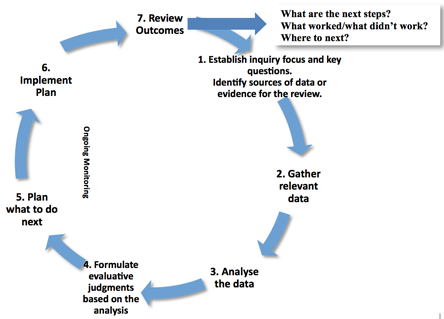The review process
A self-review cycle will help to make the process manageable. It should link into the school’s annual plan as part of an ongoing action learning process.
Action learning cycle
You could adapt this cycle to the review of any system, process, or aspect of the school, for example, student engagement, performance management (appraisal), learning support, or learning extension programmes.
View text version of this diagram.
Planning
- Consider all relevant information.
- Prioritise areas for improvement.
- Plan actions/interventions.
- Decide how you will measure progress.
Data analysis
Compare student achievement to a benchmark or target as a frame of reference, for example:
- normed assessment tools
- school achievement targets
- external standards or benchmarks
- NZ curriculum levels
- previous achievement.
Look for/consider:
- patterns, trends, and outliers
- areas of strength and areas of improvement
- information from staff appraisals
- common PD needs.
Timing of self-review
A self-review calendar/timetable should map out the review cycle and focus areas for at least the current year, although the timing, frequency, and length of the process will vary depending on the needs, circumstances, and priorities of individual schools. Whatever the timing, the review calendar/timetable itself should be subject to ongoing, regular monitoring and review by the Board and school leaders.
See an example of a primary school self-review calendar:
BoT self-review calendar example (Word 2007 18 kB)
Reflection exercise
1. Identify a priority area for review in your school. Ask the following questions:
- What is the focus of your inquiry?
- Why is this a priority area for your school?
- How does this priority area relate to the NAGs/NEGs and your school’s strategic plan?
- What type of review will this be - strategic, regular, or emergent?
- Who will be involved in the review process?
- What are your key questions?
- What sources of evidence will you use?
- What do you aim to achieve?
- How will this information be used?
Plan an approach to this self-review for your school.
2. Consider the example self-review timetable.
BoT self-review calendar example (Word 2007 18 kB)
3. Adapt the blank sample template to draft a self-review timetable for the year to suit the needs of your school.
BoT self-review calendar template (Word 2007 13 kB)
Tags: school self-review

